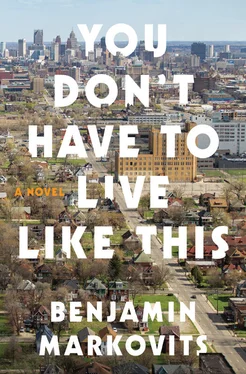I lived like this for three months, hardly leaving my apartment. Going quietly crazy, Walter called it, but making progress. I started reading again, with more attention. I read Walden again, I read Invisible Man. Native Son, Go Tell It on the Mountain, Stover at Yale . High school staples like The Awakening and Huck Finn . Walter gave me a 1942 edition of Say, Is This the U.S.A. and I spent a week looking through the photographs and reading the captions, frequently in tears. The men and women in those pictures are probably dead now, even some of the kids. There were passages in each of these books that seemed tremendously important. I thought, other people need to know about this. But they’d obviously been given the chance and it hadn’t made much difference.
When you don’t do much, when you don’t go anywhere, you notice small changes. In yourself and other people, in the world outside your window. The snow that started in late November kept accumulating — one inch, and then another, and then a few more. Mild fall, harsh winter. None of it had anywhere to go, it just piled up. I used to watch the kids play in the street. After particularly heavy nights, school would be canceled, the cold and ice made everything resound, the whole world seemed like their temporary playground. But then on other days, everyone stayed indoors. Cars sat parked on islands of frozen slush; the snow on their roofs was the last thing to stay white.
The Adlers moved out in February. Don knocked on my door, while Tina finished packing. There was a U-Haul van in his driveway.
“We’re getting out now,” he said. “We’re not going to wait around for bad news.”
“What bad news?”
“Whatever form it takes. I’ve got that prestorm feeling. This time I’m going to listen to it. Also, it’s too cold here. It’s just too cold.”
“So where are you going, back to Phoenix?”
“I never liked it there. Somewhere else. Maybe Austin, but it’s expensive now. These hipster types have a lot to answer for. Everywhere you used to find a decent quality of life, they come and drive up the price. The first place we’re going is South Bend, where the in-laws are. Then we put some things into storage. I’ve got too much stuff, I don’t use any of it. Then we make up our mind. Okay, well. So long,” he said, and I watched him cross the road flat-footed, taking care on the ice.
Nolan’s trial came at the right time for me. It snapped me out of myself, it forced me to make contact with people.
A form letter arrived from the prosecutor’s office: “Being called to testify in court may make you nervous. This is a natural reaction. .” One of their suggestions was to ask for a copy of my police statement and read it over beforehand. Which I did — it gave me a buzz to see my words officially documented. They had an air of authority, and I found it hard to remember what had actually happened, as opposed to what I had sworn to. There are all these processes that remove us from the past, step by step, and writing is part of the process. “Dress neatly,” the letter said. I shaved, I wore my leather shoes, I tucked my shirt in. And for three days, the days of my court appearances, I woke up each morning as if I had a job to do and left the house looking presentable.
My mother offered to fly into town. I told her, “Mom, you don’t have to do this, you don’t have to hold my hand.”
“What else do I do with myself?” she said.
“You were just here a few months ago. Come some other time. Come when I have time to see you. I’ll be at the courthouse all day, waiting around.”
“I can wait with you.”
So we went back and forth like that, and after a while I said, “Let me do this alone,” and she said, “Okay.”
Robert picked me up on my first day, which was day three of the trial. Somehow he had gotten a pass for the courthouse parking lot. He honked outside the house in his Saab 9–5, on one of those pissy cold transitional mornings, not freezing but thawing, where it sort of rains off and on but it doesn’t make much difference either way. Robert had the heating going pretty well; he sat there with his shirtsleeves rolled up to the elbow. You could see his forearms — instead of rowing these days, he worked out on an erg machine. There was a car seat in the back and food wrappings and bits of food all over the floor. I sat down on an empty bag of baby wipes.
“How’s it going?” I said.
“Oh, this is just what it’s always like. This is just the usual chaos.”
“No, I mean the trial.” He thought I meant the state of his car and life.
“Mostly what I’ve seen is procedural stuff. It’s not like I hang around all day. Jury selection, that kind of thing. The truth is, I don’t know what his lawyers are thinking. It’s their job to make sure this doesn’t come to court. If you’ve got a client who wants to have his say, you let him say it to you. You don’t let him say it to a judge and jury, especially given the way Nolan is likely to come across.”
“What does that mean?”
“Look, Marny. I’m sympathetic to him. But if he were my client, he’s not a guy I’d like to put on the stand.”
“He always struck me as pretty persuasive.”
“All right,” Robert said. “Let it go.”
The downtown traffic is never very heavy in Detroit, but there was some buildup along Gratiot, and even more when he turned onto St. Antoine: a queue of cars outside the parking lot, which was separated by a chain-link fence from the road, and already half full. We got stuck for a minute behind some media van, whose driver had pulled over to unload equipment. Eventually Robert drove around him and down a side street and parked in one of the spaces slanted against a bay in the building.
“There’s something else I wanted to talk to you about,” he said. “You’re going to notice some extra security around. I don’t want you to worry about it. There are people I pay to give me advice, and this is the advice they give me, so I listen. But I’m not really worried.”
“What kind of security?”
“A few extra patrol cars, private security cars. As long as the trial lasts, there’ll be two guys in chairs on either end of your street. Just to see who comes and goes. That’s all. Well, here we go.”
Robert took me inside by a back entrance, through the metal detectors, up some steps and around some corners, down through administrative-looking hallways and then into a slightly grander hallway, where one of the news crews was setting up. I left him by the entrance to the courtroom — he wanted to get a good seat. But there were officers of the court I had to show my papers to, and I ended up, about a half hour later, in some waiting room for witnesses.
I spent a lot of time in that room. It wasn’t very big and had carpeting and stippled paneling on the ceilings and one of those water kegs that glugs from time to time. There were two posters on the wall: River in a Mountain Landscape , by John Mix Stanley, which showed not so much a river as a kind of swampy dead end or pond in front of a couple of hills. The other poster was a team photo of the ’88–’89 Detroit Pistons, who won the NBA Championship when I was fourteen or fifteen. It made me feel one of those weird overlaps or crossovers or connections between selves, and I started going through the roster to see who I could remember. There were three names I didn’t know, Jim Rowinski, Pace Mannion and Fennis Dembo. When I got up to stretch my legs I often walked over to this poster and tried to work out who was who.
People in the room came and went — they got called up, they walked out, they came back. The prosecutor’s office had assigned me a witness coordinator, who checked in from time to time. She was an attractive, disorganized woman named Sharia. Mostly when I saw her she had coffee in one hand, papers in another, two tote bags on the same shoulder, that kind of thing.
Читать дальше












